January 2023
Foot Pain and Tight Shoes
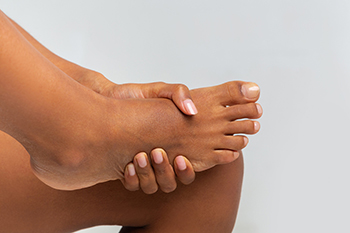
Foot pain, no matter the cause, can be considerably uncomfortable and annoying. Many patients who suffer from foot pain often wonder what the exact cause is. Although the answer may be complicated, one common and often overlooked cause of foot pain is wearing shoes that are too tight. When the feet are feeling painful, or sore from wearing tight shoes there are a variety of different things that can be done to relieve the pain. For instance, you may be able to cure the soreness by performing therapeutic stretches, and there are many different kinds and varieties. One such stretch can be performed in a seated position. You might cross one leg over the other and then weave your fingers in between the toes of the foot that is elevated. By spreading the toes apart, you are essentially stretching them. If you are someone that has foot pain, also consider contacting a podiatrist for an evaluation. Schedule an appointment today.
Foot Pain
Foot pain can be extremely painful and debilitating. If you have a foot pain, consult with Dr. Lee R. Stein from Lake Shore Foot & Ankle, PC. Our doctor will assess your condition and provide you with quality foot and ankle treatment.
Causes
Foot pain is a very broad condition that could be caused by one or more ailments. The most common include:
- Bunions
- Hammertoes
- Plantar Fasciitis
- Bone Spurs
- Corns
- Tarsal Tunnel Syndrome
- Ingrown Toenails
- Arthritis (such as Gout, Rheumatoid, and Osteoarthritis)
- Flat Feet
- Injury (from stress fractures, broken toe, foot, ankle, Achilles tendon ruptures, and sprains)
- And more
Diagnosis
To figure out the cause of foot pain, podiatrists utilize several different methods. This can range from simple visual inspections and sensation tests to X-rays and MRI scans. Prior medical history, family medical history, and any recent physical traumatic events will all be taken into consideration for a proper diagnosis.
Treatment
Treatment depends upon the cause of the foot pain. Whether it is resting, staying off the foot, or having surgery; podiatrists have a number of treatment options available for foot pain.
If you have any questions, please feel free to contact one of our offices located in Chicago, Highland Park, and Uptown, IL . We offer the newest diagnostic and treatment technologies for all your foot care needs.
Ways to Prevent Ankle and Foot Injuries in Gymnastics
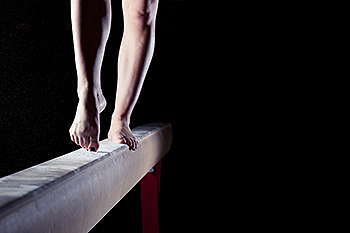
Ankle and foot injuries are common among gymnasts. This makes sense given that this sport has so many high-impact moves and repetitions. With early specialization, year-round training, and younger people doing gymnastics, injuries can be more common than need be. Young gymnasts may not be developed enough to have the physical preparation to protect their ankle joints and open growth plates cause more injuries to happen to them. Proper progression of exercise, coaching, and conditioning before workouts, can reduce injuries in this sport. Strength training, including lifting weights, can be helpful in handling high-impact forces. Adopting science-based landing mechanics using a squat-based landing with feet and hips wide apart can also dissipate high-force impacts. If you or your child participates in gymnastics, it might be beneficial to speak to a podiatrist to learn more about reducing injuries before participating in this activity.
Sports related foot and ankle injuries require proper treatment before players can go back to their regular routines. For more information, contact Dr. Lee R. Stein of Lake Shore Foot & Ankle, PC. Our doctor can provide the care you need to keep you pain-free and on your feet.
Sports Related Foot and Ankle Injuries
Foot and ankle injuries are a common occurrence when it comes to athletes of any sport. While many athletes dismiss the initial aches and pains, the truth is that ignoring potential foot and ankle injuries can lead to serious problems. As athletes continue to place pressure and strain the area further, a mild injury can turn into something as serious as a rupture and may lead to a permanent disability. There are many factors that contribute to sports related foot and ankle injuries, which include failure to warm up properly, not providing support or wearing bad footwear. Common injuries and conditions athletes face, including:
- Plantar Fasciitis
- Plantar Fasciosis
- Achilles Tendinitis
- Achilles Tendon Rupture
- Ankle Sprains
Sports related injuries are commonly treated using the RICE method. This includes rest, applying ice to the injured area, compression and elevating the ankle. More serious sprains and injuries may require surgery, which could include arthroscopic and reconstructive surgery. Rehabilitation and therapy may also be required in order to get any recovering athlete to become fully functional again. Any unusual aches and pains an athlete sustains must be evaluated by a licensed, reputable medical professional.
If you have any questions please feel free to contact one of our offices located in Chicago, Highland Park, and Uptown, IL . We offer the newest diagnostic and treatment technologies for all your foot and ankle needs.
Obesity May Affect Foot Size
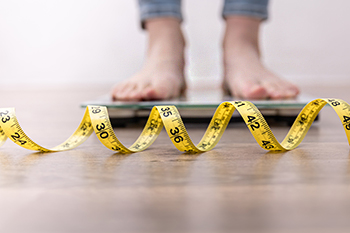
People who have gained a significant amount of weight may notice their feet have increased in size. Additionally, there may be foot pain that has developed because of the added weight, and this may cause the connective tissue to stretch. The fat pads that cushion the soles may begin to wear down and painful foot conditions, like plantar fasciitis, may develop. Edema, also known as abnormal swelling, may occur, and the feet may look bigger than their bone structure. It is beneficial for obese patients to lose weight to alleviate some or all the existing foot problems. This is especially true of people who are diabetic, because losing weight may help to reduce blood sugar levels as well as decrease the risk of foot complications. The feet may become smaller when a significant amount of weight has been lost, and the correct shoe size will need to be purchased. If you have questions about how obesity affects the feet, please speak with a podiatrist who can provide the best course of treatment for you.
The more you weigh, the harder your feet must work to support your body. If you’re an obese individual and are concerned about your feet, contact Dr. Lee R. Stein from Lake Shore Foot & Ankle, PC. Our doctor can provide the care you need to keep you pain-free and on your feet.
Obesity and Your Feet
People who are overweight are putting more pressure on their ankles, knees, and hips as well as their feet. This unfortunately can lead to variety of different issues.
Problems & Complications Stemming from Obesity
- When the body is overweight, it tries to compensate by changing the way that it moves. An obese person may lean forward and put extra weight on the wrong part of the foot. This puts unnecessary stress on the feet.
- Obese people are also more likely to develop type II diabetes which is a condition that causes a lot of foot problems. People with diabetes often don’t feel the cuts and sores that they may have on their feet, which can lead to more complicated and severe issues.
- Plantar fasciitis is another foot condition that can be caused by obesity. Plantar fasciitis is an inflammation of the tissue along the bottom of the foot, which causes pain and stiffness while walking and climbing stairs.
If you have any questions, please feel free to contact one of our offices located in Chicago, Highland Park, and Uptown, IL . We offer the newest diagnostic and treatment technologies for all your foot care needs.
How to Properly Diagnose Sever’s Disease
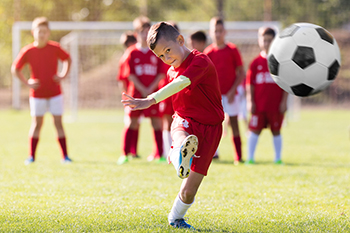
Children who frequently participate in sporting activities may be prone to developing Sever’s disease. It is a condition that affects the growth plate in the heel in children and young teenagers, and limping is a noticeable sign. The foot grows to its full size during early puberty and often grows faster than the surrounding tendons and muscles. The foot can become less flexible and can cause extra pressure where the Achilles tendon connects to the heel. A diagnosis that is referred to as the squeeze test is often performed, which is done by squeezing both sides of the heel. Flexibility may be limited, and it may be painful to walk. Effective prevention methods can include having your child wear shoes that have additional cushioning in the heel area, and performing specific stretches that can strengthen the heel. If your active child has heel pain, please consult with a podiatrist who can accurately diagnose Sever’s disease, and offer correct treatment options.
Sever's disease often occurs in children and teens. If your child is experiencing foot or ankle pain, see Dr. Lee R. Stein from Lake Shore Foot & Ankle, PC. Our doctor can treat your child’s foot and ankle needs.
Sever’s Disease
Sever’s disease is also known as calcaneal apophysitis, which is a medical condition that causes heel pain I none or both feet. The disease is known to affect children between the ages of 8 and 14.
Sever’s disease occurs when part of the child’s heel known as the growth plate (calcaneal epiphysis) is attached to the Achilles tendon. This area can suffer injury when the muscles and tendons of the growing foot do not keep pace with bone growth. Therefore, the constant pain which one experiences at the back of the heel will make the child unable to put any weight on the heel. The child is then forced to walk on their toes.
Symptoms
Acute pain – Pain associated with Sever’s disease is usually felt in the heel when the child engages in physical activity such as walking, jumping and or running.
Highly active – Children who are very active are among the most susceptible in experiencing Sever’s disease, because of the stress and tension placed on their feet.
If you have any questions, please feel free to contact one of our offices located in Chicago, Highland Park, and Uptown, IL . We offer the newest diagnostic and treatment technologies for all your foot and ankle injuries.
How Common Are Swollen Feet During Pregnancy?
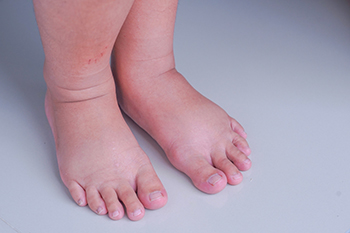
Many pregnant women notice their growing fetus produces several changes to the body. The feet are often affected, and can become swollen as the pregnancy progresses. It is considered to be an uncomfortable but normal part of pregnancy, and some women may need to buy larger shoes during this time. Swollen feet during pregnancy can happen as a result of extra pressure that is put on the blood vessels, which carry the blood from the legs to the heart. Fluid retention can happen from this, and the medical term for this is known as edema. Additionally, the feet may become larger from the hormone relaxin, which is responsible for loosening the ligaments in the feet. There are effective methods that can help to manage swollen feet during this time. These can consist of drinking plenty of water, limiting sodium intake, and frequently elevating the feet. Additionally, it may help to refrain from crossing the legs, and wearing support stockings may help to limit fluid retention. If you have concerns about how pregnancy can affect the feet, please consult with a podiatrist who can answer any questions you may have.
Pregnant women with swollen feet can be treated with a variety of different methods that are readily available. For more information about other cures for swollen feet during pregnancy, consult with Dr. Lee R. Stein from Lake Shore Foot & Ankle, PC. Our doctor will attend to all of your foot and ankle needs.
What Foot Problems Can Arise During Pregnancy?
One problem that can occur is overpronation, which occurs when the arch of the foot flattens and tends to roll inward. This can cause pain and discomfort in your heels while you’re walking or even just standing up, trying to support your baby.
Another problem is edema, or swelling in the extremities. This often affects the feet during pregnancy but tends to occur in the later stages.
How Can I Keep My Feet Healthy During Pregnancy?
- Wearing orthotics can provide extra support for the feet and help distribute weight evenly
- Minimize the amount of time spent walking barefoot
- Wear shoes with good arch support
- Wear shoes that allow for good circulation to the feet
- Elevate feet if you experience swelling
- Massage your feet
- Get regular, light exercise, such as walking, to promote blood circulation to the feet
If you have any questions please feel free to contact one of our offices located in Chicago, Highland Park, and Uptown, IL . We offer the newest diagnostic and treatment technologies for all your foot and ankle needs.
Are You Suffering From Ingrown Toenails?
Blog Archives
- April 2025
- March 2025
- February 2025
- January 2025
- December 2024
- November 2024
- October 2024
- September 2024
- August 2024
- July 2024
- June 2024
- May 2024
- April 2024
- March 2024
- February 2024
- January 2024
- December 2023
- November 2023
- October 2023
- September 2023
- August 2023
- July 2023
- June 2023
- May 2023
- April 2023
- March 2023
- February 2023
- January 2023
- December 2022
- November 2022
- October 2022
- September 2022
- August 2022
- July 2022
- June 2022
- May 2022
- April 2022
- March 2022
- February 2022
- January 2022
- December 2021
- November 2021
- October 2021
- September 2021
- August 2021
- July 2021
- June 2021
- May 2021
- April 2021
- March 2021
- February 2021
- January 2021
- December 2020
- November 2020
- October 2020
- September 2020
- August 2020
- July 2020
- June 2020
- May 2020
- April 2020
- March 2020
- February 2020
- January 2020
- December 2019
- November 2019
- October 2019
- September 2019
- August 2019
- July 2019
- June 2019
- May 2019
- April 2019
- March 2019
- February 2019
- January 2019
- December 2018
- November 2018
- October 2018
- September 2018
- August 2018
- July 2018








